He is Favored 8
He is Morning: The People of Elohim
And of early dawn he became near backwards into the Sacred Place, and the Entire People,80 was coming toward himself. And he who sat down was teaching themselves.
καταλαμβάνω - To take down, overtake, capture, seize
And the Scholars and the Separatists are leading a woman upon an adultery, she who has been captured-down and those who have stood herself within a middle,
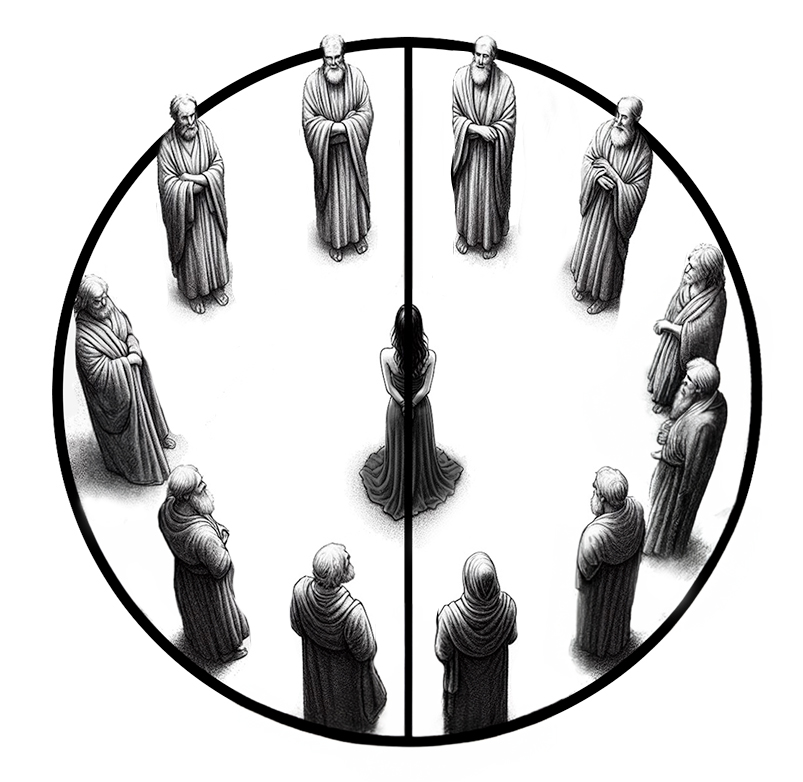
"The beginning of ordering words of He Is in Salvation. And he is saying, He Is toward Salvation, "Walk, take hold to yourself a woman of whorings and boys of whorings, for the Earth, he whored, she is whoring from behind He Is. (Hosea 1:2 RBT)
"Adulteresses, do you not see that the Friend of the Order, she is a hated-one/enmity of the God? If therefore whoever has determined to be a friend of the Order, he is set down a hated-one/enmity of the God!" (James 4:4 RBT)
αὐτόφωρος - self betrayed/self Exposed
They are saying to self, "Teacher, she, herself, the Woman, was seized/overtaken on account of a self-betrayal, she who is commiting adultery.80aAnd within the Custom/Usage, Drawn Out ("Moses") commanded ourselves to stone those Kinds. You, yourself therefore, what are you saying?"
κατέγραφεν - draw in outline
And they were saying this thing, those who are putting himself to the test, so that they might hold to bring accusation against himself. And the Salvation, he who has stooped down with the Finger, was drawing in outline into the Earth.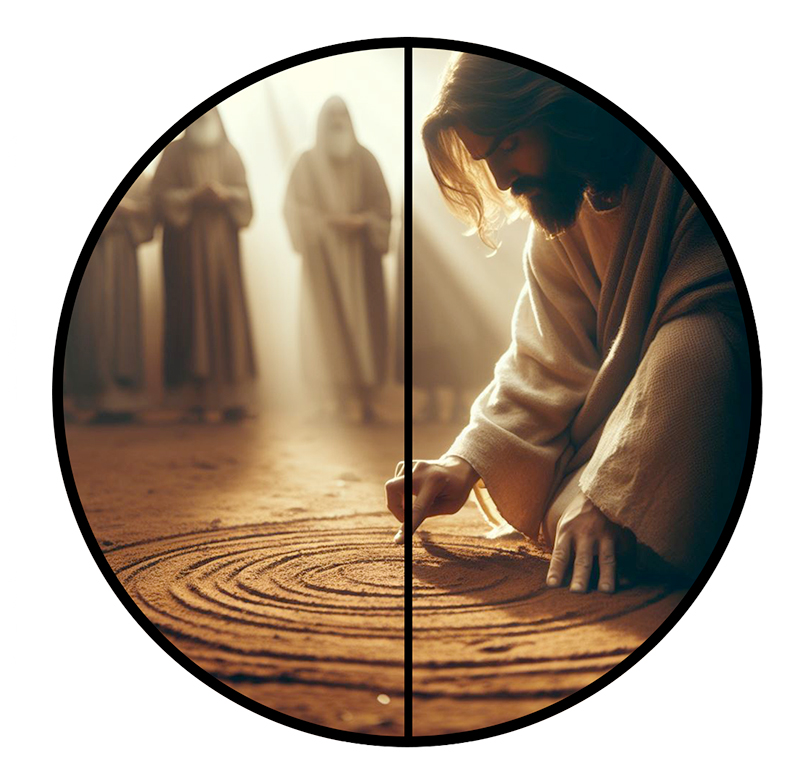
"To the upright one, thus He is Master has said, 'Behold myself! I lay for a foundation in Monument (Zion) a stone stone, a tried one, a precious cornerstone, a foundation foundation. The one who is trusting is not delaying!" (Isaiah 28:16 RBT)
Thus is the Queen of God: if a man may cast the seed upon the Earth, and might sleep and wake up, night and day, and the seed should sprout and grow, he knows not how. Of her own self the Earth brings forth fruit: [1] first a grass, [2] then the head of grain, [3] then the complete wheat within the head of grain. (Mark 4:24-28 RBT)The First one, Unbent
But even as those who are questioning himself were staying on, he straightened back up, and he said to themselves, "The first un-missing/un-sinning one80b of yourselves, let him found the Stone upon herself."
"For the whole has missed the mark [sinned] and has fallen behind the Glory of the God." (Romans 3:23 RBT)
ἔγραφεν - Draw/Inscribe a Second Time, "An Opportune time and An Opportune time"
And he who stooped down backward was drawing into the Earth.
- In the opposite direction, backward (e.g., πάλιν χωρεῖν, Hdt. 5.72, "go back"; πάλιν ἐπανιέναι, Xen. Hell. 6.1.7, "return").
- Contrarily, in opposition (e.g., πάλιν ἐρεῖν, Il. 9.56, "contradict").
- Repeated action, again (e.g., πάλιν ὁ Κῦρος ἠρώτα, Xen. Cyr. 1.6.7, "Cyrus asked again").
συνείδησις - Joint Consciousness
And the ones who have heard, and those who are being put to shame under the Co-consciousness, they were coming out one according to one,81 those who began away from the Elder Ones until the Ones of last ones, and the Salvation was left remaining solitary, and the Woman, she who is being within the middle.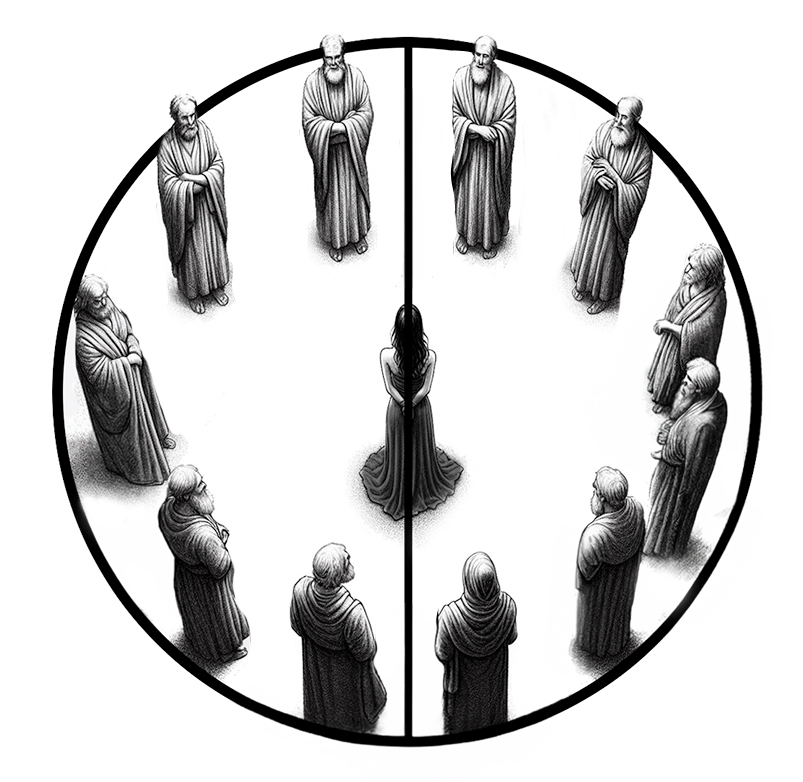
הפעם - The Stroke/Now, The Woman! - John 2:1, 4:21
And the Salvation, he who straightened back up, and he who gazed at no one else except the Woman, said to herself, "The Woman!82 Where are those ones, the Accusers of yourself? Has no one down-separated yourself?"
"This one, the Stroke/Now!"
(Genesis 2:23 RBT)
θεάομαι - gaze at, behold, mostly with a sense of wonder (cf. LSJ)
Mark Acquired: The Now
And the one said, "No one, Master!" And the Salvation said to herself, "Neither do I, Myself separate-down yourself! Lead across, and no longer miss away from the !83
צהרים Tsoharayyim - Dual Light (Noon, Zenith)
Therefore the Salvation chatted backwards to themselves, he who is speaking, "I, Myself am the Daylight of the Order. The one who is accompanying myself, shall never tread around within the Dark One, but rather he will hold the Daylight of the Zoe-Life!"The Separatists therefore said to self, "You, yourself are bearing witness around to your own self. The Testament of yourself, she is not a true/real one!"
And Salvation separated and said to themselves, "Even if I, myself am bearing witness around to my own self, the Testament, she is a true/real one of myself, because I see where I came from, and where I am leading on to. But you, yourselves have not seen where I am coming from, or where I am leading on!
You, yourselves are separating downwards the Flesh. I, Myself am separating no one.
And even if I, myself am also separating, the Separation of My Own is a true/real one because I am not solitary, but rather myself, and the one who sent myself.
Your Own vs My Own
And even within the Custom/Usage, and the one of Your Own, it has been written/engraved that the Testament of two men, she is a true/real one!Three Bear Witness (Myself is—who—Myself is)
I, Myself am the one who is bearing witness around to my own self, and he is bearing witness around to myself, the one who sent myself, a father!"83bWho's the Father? Myself.
Therefore they kept saying to self, "Where is the Father of yourself?" Salvation separated, "You have neither seen myself, nor the Father of myself! If you had seen myself, you would have seen also the Father of myself!"Can't Grasp Until She Comes
These ones, the Sayings, he uttered within the Treasure-House, teaching within the Sacred Place, but no one grasped himself for she had not yet come, the Hour of Himself.
The treasury stored various valuable items and offerings for the upkeep and maintenance of the sacred/holy place. These included precious metals like gold, silver, and bronze, donated for construction and sacred vessels. Additionally, jewels, gemstones, and monetary gifts from the people funded operational expenses. Offerings such as grain, oil, wine, and livestock were stored before use in religious rituals, along with artifacts and religious objects like scrolls and incense burners. These items were essential for worship and service...
He said therefore backward to themselves, "I, myself am bringing under, and you will search for myself, but within the Miss of yourselves, you will die off! Where I, myself am bringing under, you, yourselves have no power to come!
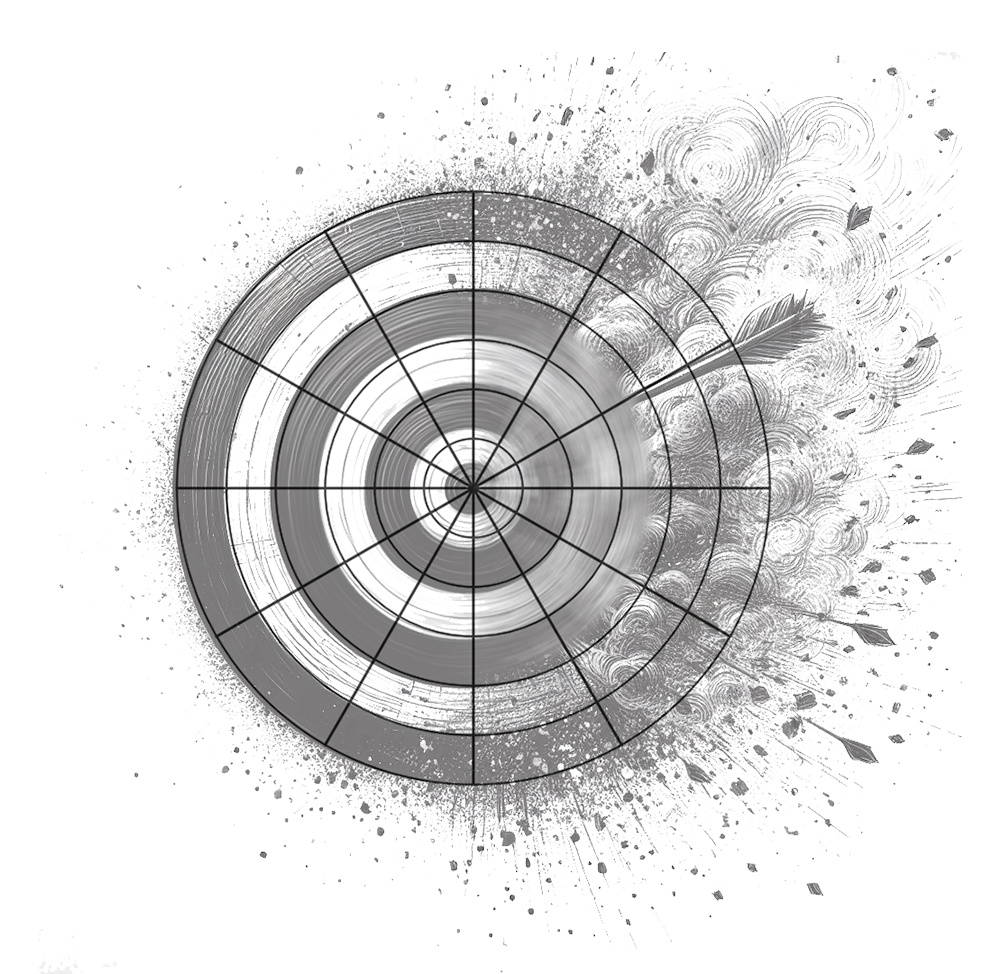
"He will depart and go to Heaven"
Therefore the Casters kept saying, "Will he not kill away his own self? Because he is saying, Where I, myself am leading on, you, yourselves have no power to come."And he kept saying to themselves, "You, Yourselves are from out of the Things Down Below. I, Myself am from out of the Things On High. You, Yourselves are from this Order. I, Myself am not from this Order.
Trust 'I, Myself am'
Therefore I said to yourselves that you will die off within the Misses of yourselves! For if you do not trust that 'I, Myself Am', you will die off within the Misses of yourselves!Genesis 1: He is Evening, He is Morning
They were saying therefore to self, "Who is 'you, yourself'?" The Salvation said to themselves, "The Origin/Beginning that I am also chatting to yourselves!84I am holding multitudinous ones from around yourselves, to chat and to separate. But the one who has sent myself is true/real, even I, whichever ones I have heard from close beside himself, I am chatting these things into the Order."
Turning the Heart...Malachi 4:6
They did not know that he kept saying 'the Father' to themselves.85The Salvation therefore said to themselves, "Whenever you should exalt the Son of the Man, then you will know that 'I, Myself am' and away from my own self I am making nothing, but rather according to what the Father taught myself, these things I am uttering!

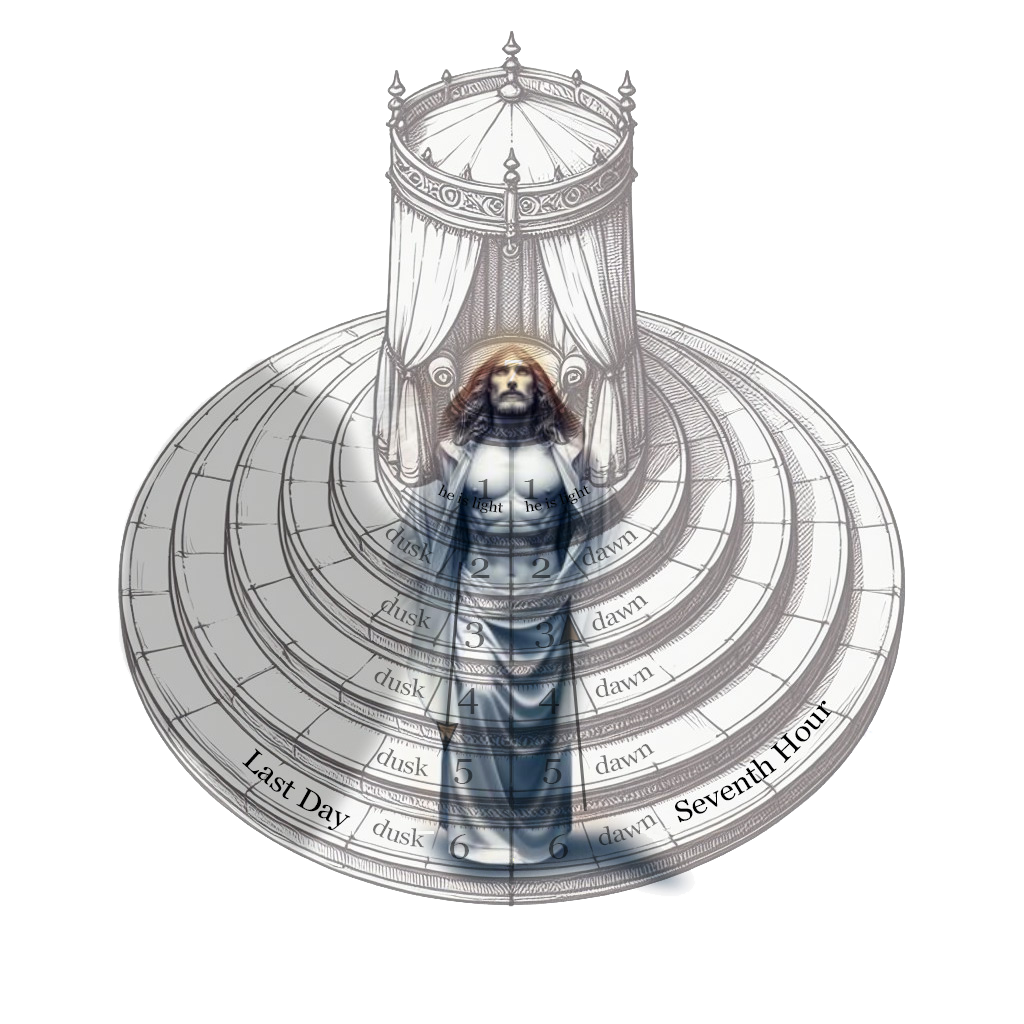
And the one who has sent myself, he is in company with myself. He has not sent away myself solitary, because I, myself am making the things agreeable/fitting for himself, at all times!"
Of him, himself who is chatting these things, multitudes trusted into himself.
Casters: "Those who Trusted Self"
Therefore the Salvation was saying toward the Casters who have trusted self,85b "If you, yourselves remain within the Word/Logos, the one of Mine, you are truly learners of myself!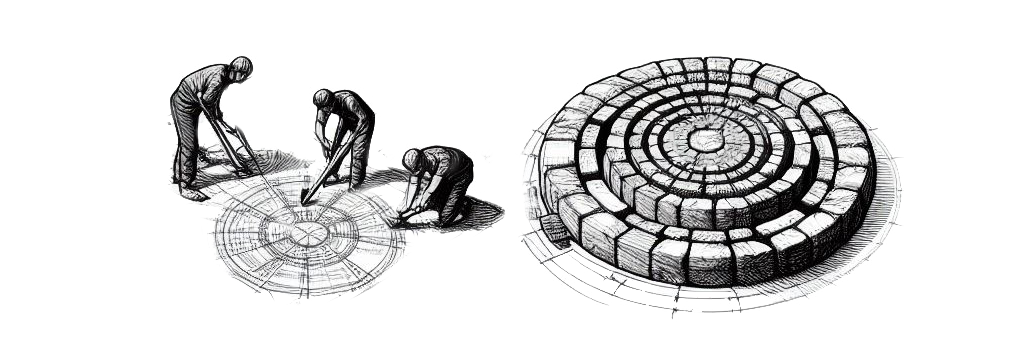
"And yourselves as stones, those who live, are being house-built, a breathing household, into a sacred priesthood, to bring up breathing ones, offered ones acceptable to the God through Salvation Anointed." (1 Peter 2:5 RBT)
And you will recognize the Real/True One, and she, the Real/True One, will set free yourselves!"
They separated toward himself, "We are a seed of Father of Multitude ("Ab-raham"), and we have been in slavery to no one at any time! How do you, yourself say that 'You will become free ones'?"
The Salvation separated to themselves, "Trustworthy One Trustworthy One!I am speaking to yourselves, that everyone who is making the Miss, is a born bondman of the Miss!
Into the aiona time
The Slave, then, is not remaining within the House, into the Eternal (aiōn) One! The Son is remaining/enduring into the Eternal (aiōn) One.If therefore the Son is setting yourselves free, you will be in reality, free!
I see that you are a seed of Father of Multitude, but you are searching for myself to kill off myself, because the Logos Ratio, the one of Mine does not fit within yourselves!
You Make what you hear (a feedback Loop)
Whatever things I, myself have perceived from close beside the Father, I am chatting. Therefore also whatever things you, yourselves have heard close beside the Father, you are making! They separated and said to self, "The Father of ourselves is Father of Multitude!" The Salvation is saying to themselves, "If you are children of the Father of Multitude, you were making the Works of the Father of Multitude!You were doing it
But , you are searching for myself to kill off a man who has spoken the Real/True One to yourselves, her whom I heard from close beside the God! Father of Multitude did not make this!
"We are Children of God!"
You, yourselves are making the Works of the Father of yourselves!" They said therefore to self, "We, ourselves have not been fathered from out of prostitution! We are holding one father, the God!"You never agape-loved myself
The Salvation said to themselves, "If the God was being a father of yourselves, you would have agape-loved myself,86 for I, myself came forth from out of the God, and I have become present! For neither have I become present away from my own self, but rather that one sent away myself!Hannah: You don't know because of the Babble
For what reason do you not understand the Speech, the one of Mine? Because you are not able to hear the Word/Logos, the one of Mine!
"the mouth of yourself is lovely"
(Song of Songs 4:3 RBT)"And Favored ("Hannah"), she, herself who is ordering words upon the Heart of herself, only the dual-lips of herself, those wandering to and fro. And the voice of herself is not being heard, and Lofty ("Eli") is reckoning her for a drunkard."
(1 Samuel 1:13 RBT)The Father of the Accuser
You, yourselves are from out of the Father of the Accuser, and the Desires/Passionate Longings of the Father of yourselves, you are desiring to make! That one was a manslayer away from an origin, and within the True/Real One he has not stood ready, because there is not a true/real one within himself! Whenever he might chat, from his Own Ones he is chatting the Lie, because he is a liar, and the Father of Himself!87And because I, myself am speaking the True/Real one, you are not trusting to myself!
"Me"
Who from out of yourselves is exposing myself around a miss? If I am speaking a true/real one, for what reason are you, yourselves not trusting to myself?The one who is being from out of the God is hearing the Sayings of the God. Because of this you, yourselves are not hearing, because you are not from out of the God!"
The Casters separated and said to self, "Are not we, ourselves, beautifully/nobly speaking that you, yourself, are a Watchman ("Samaritan") and are holding a demonic spirit?"
They Honor myself with their lips, but the Heart is far from myself
Salvation separated, "I, myself am not holding a demonic spirit, but rather I value/honor the Father of myself, and you, yourselves are bringing dishonor on myself!And I, myself am not searching for the Glory of myself, He Is, the one who is searching and who is separating!
Trustworthy One Trustworthy One! I am speaking to yourselves, If anyone watches over the Logos Ratio of Myself, he will never contemplate death into the Eternal (aiōn) One! The Casters said to self, ", we know that you are holding a demonic spirit! Father of Multitude died away, and also the Prophets, and you, yourself are saying, If anyone watches over the Logos Ratio of Myself, he will never taste death into the Eternal (aiōn) One!
You, yourself are not more mega than the Father of Ourselves, Father of Multitude, anyone who died away. And also the Prophets died away. Who are you making your own self?
"Myself is no better than my fathers" - 1 Kings 19:4
Salvation separated, "If I, myself should glorify my own self, the Glory of myself, she is nothing. He is the one who is glorifying myself whom you, yourselves are speaking that 'He is the God of ourselves'!I saw myself
And you have not recognized himself! But I, myself have seen himself! And if I should say that I have not seen himself, I will be the same as yourselves— a liar! Except I have seen himself, and the Word/Logos of Himself I am watching over!Father of Multitude, the Father of yourselves, leaped-exceedingly, so that he might see the Day, the one of Mine, and he saw, and he rejoiced!"
40s
Therefore the Casters said toward himself, "You are not even holding fifty years, and you have seen Father of Multitude?"Salvation said to themselves, "Trustworthy One Trustworthy One, I am speaking to yourselves, 'Before Father of Multitude becoming I, Myself am!'"88
παραγώ - leading aside from a way, diverting
Therefore they raised up stones, so that they might cast upon himself. But Salvation was concealed, and he came out from the Sacred Place, passing straight across through the middle of themselves, and he was in this manner leading aside.Footnotes
The People of Elohim
The Greek word "λαός" (laos, Strong's number 2992) and its Hebrew counterpart "עַם" ('am, Strong's number 5971) convey not only a collective sense of peoplehood but also carry a profound prophetic aspect of unity and cohesion. Both terms, extensively utilized throughout their respective scriptures, depict a people bound together by shared identity, heritage, and destiny.
In the prophetic context, "λαός" and "עַם" ('am) signify not merely a disparate group but a unified entity, chosen and called by a higher purpose. This unity is not only historical but also anticipates a future culmination in which the (thoroughly) scattered and diverse will be brought together in divine unity. Such prophetic connotations are particularly evident in passages foretelling the gathering and restoration of God's people, reflecting a vision of harmony and solidarity under the divine word.
Thus, the correspondence between "λαός" and "עַם" ('am) underscores the prophetic continuity between the Hebrew texts and New Testament, portraying "the People" as more than a mere aggregation but as a divinely ordained brotherhood, family—the Elohim—mighty, lofty ones intricately bound together in purpose and destiny.
The word "ἐπαυτοφώρῳ" (epautophōrō) occurs only once here in the NT. Generally when a special word shows up in the NT there is a really good reason for it.
-
"ἐπί" (epi): A preposition meaning "upon" or "in."
-
"αὐτόφωρος" (autopōros): An adjective derived from "αὐτό" (auto), meaning "self," and "φωρός" (phōros), meaning "watching" or "observation." "ἐπαυτοφώρῳ" (epautophōrō) functions as an adverbial form of "αὐτόφωρος" (autopōros).
So, "ἐπαυτοφώρῳ" (epautophōrō) means "upon being self caught" or "self revealed."
(cf. LSJ αὐτοφώρατος)
The literal translations of "ἐπαυτοφώρῳ" (epautophōrō) are:
- Upon self-observation.
- Caught by oneself.
- Self-caught.
- Caught in the act by oneself.
- Caught red-handed by oneself.
To Cast a Foundation Stone
Strongs NT 361 "ἀναμάρτητος" (anamartétos) is composed of "ἀ" (alpha) as a negative prefix and "ἁμαρτάνω" (hamartanó), meaning "to miss the mark" or "to sin." The literal translation of "ἁμαρτάνω" (hamartanó) is understood literally as "to miss" or "to err," and thus "ἀναμάρτητος" (anamartétos) is rendered as "un-missing" or "not missing the mark." This highlights the concept of what it means to be "faultless" or "unerring", emphasizing the idea of hitting the target "eye" to achieve completion.
Missing the bullseye therefore, means the Whole is in error, and "in the transgression".
Found a stone upon her. There is quite the mix up of grammar among the variety of manuscripts with this verse. The early, authoritative copies (cf. Nestle 1904, also evidenced in the Textus Receptus) has:
Ὁ ἀναμάρτητος ὑμῶν πρῶτος τὸν λίθον ἐπ’ αὐτῇ βαλέτω
Literal Translation:
-
- Ὁ ἀναμάρτητος ὑμῶν πρῶτος: "The sinless one of you first/the first sinless one of you"
- τὸν λίθον (ton lithon): "The Stone" (accusative singular, definite article + noun, specifying "the stone").
- ἐπ’ αὐτῇ (ep’ autē): "Upon her" (ἐπί + dative feminine pronoun αὐτή, indicating target or location, "on her").
- βαλέτω: "Let him cast."
Literal: "The sinless one of you first the stone upon her let him cast."
The reading changes dramatically from the accusative sense used in other manuscripts (cast a stone at her) to the dative (cast/place a stone on her), depending on which one you choose.
The accusative must be present for the sense of "throw at":
"with acc. of person or thing aimed at, throw so as to hit, hit with a missile,"
(cf. LSJ A.I βάλλω)
With the dative, it takes a different sense of throwing or shooting with:
"c. dat., of the weapon, throw or shoot with a thing"
(cf. LSJ A.II)
A Dative Meaning, Upon Herself
The middle form of βάλλω, beyond its core sense of “to throw,” acquires a range of metaphorical/idiomatic meanings. When βάλλομαι is used in the middle voice with the metaphorical meaning “to lay upon oneself” or “to internalize” (e.g., thoughts, plans, emotions), it is often followed by dative constructions—especially datives of location or instrument—and also by prepositional phrases expressing mental or internal domains. The middle voice is inferred from context.
Of particular note is its use in the sense “to lay as a foundation” or “to begin to construct.” This occurs, for example, in Pindar, Pyth. 7.3 (κρηπῖδα βαλέσθαι, “to lay the base/foundation”) and Plato, Laws 779b (οἰκοδομίας βάλλεσθαι, “to lay the foundation of a building”). The verb here carries the extended metaphor of initiating or establishing something substantial, whether physical or institutional. Similar usage appears in Lucian, Hippias 4, and in Polybius (χαράκα βάλλεσθαι, “to lay out a trench”), as well as in Philostratus (ἱερὸν βάλλεσθαι, “to found a temple”). Thus, βάλλεσθαι can denote not just physical casting but the act of founding, building, or inaugurating.
(cf. LSJ B.4)
The First Sinless One. Grammatically, the phrase ὁ ἀναμάρτητος πρῶτος (nominative masculine singular) is composed of two adjectives functioning together in an attributive construction: ὁ (definite article) + ἀναμάρτητος (“sinless”) + πρῶτος (“first”). Both adjectives agree in case, gender, and number and together modify an implied noun (e.g., “man” or “one”), yielding the literal meaning “the first sinless one.” This structure follows standard Greek syntax in which multiple adjectives governed by a single article may serve jointly to substantivize the phrase. Compare constructions such as ὁ σοφὸς πλούσιος (“the wise rich man”) or ὁ καλὸς νέος (“the handsome young man”).
In the NT, the nominative πρῶτος (prōtos) is very frequently used to express "the first person," and in particular, "the first foundation stone" of Revelation 21:19.
Among other narratives, this correlates to Jacob [Heel] and Esau [Prepared], twin brothers born one against one. Manifesting the dual nature of the heavenly ones. The heavenly one goes out from the greater, older, and sojourns back around to the smaller, younger one, until "face to face" with himself.
The Woman
According to the older, more reliable manuscripts, there is a definite article attached to the word "woman" meaning "the Woman". The bad habit of downplaying the woman by those men in charge of handling the transmission of the letters, thinking that the definite article shouldn't be a part of a vocative statement when speaking to a "sinful harlot woman," likely led to later copies removing the definite article altogether, giving the words a more condescending effect, when they should be uplifting.
"ἀνακύψας δὲ ὁ Ἰησοῦς, καὶ μηδένα θεασάμενος πλὴν τὴς γυναικὸς, εἶπεν αὐτῇ, Ἡ γυνὴ, ποῦ εἰσιν ἐκεῖνοι οἱ κατήγοροί σου; οὐδείς σε κατέκρινεν;"
John 8:10 Greek NT: Nestle 1904
This "calling out" to "the Woman" or shall we say, "THE woman", is done elsewhere such as in Matthew 15:28.
![]()
The Eternal Now
John 8:11
Greek NT: Westcott and Hort 1881 ἡ δὲ εἶπεν Οὐδείς, κύριε. εἶπεν δὲ ὁ Ἰησοῦς Οὐδὲ ἐγώ σε κατακρίνω· πορεύου, ἀπὸ τοῦ νῦν μηκέτι ἁμάρτανε.
Some manuscripts omit this clause likely because of the confusing nature of it: "away from the Now". What sense does it make to put a definite article "the" with the word "now" or the use of the preposition "away from"?
Seen in the light of the target of the eternal, it makes perfect sense. The center bullseye is "now". The center of cyclical time would be a definitive, specific "Now" and not merely one of many indefinite "moments".
Greek πατήρ, a father. There is no definite article present here, thus it is not rendered "the Father."
Greek τὴν ἀρχὴν ὅ τι καὶ λαλῶ ὑμῖν.
"Τὴν ἀρχὴν" (Tēn archēn): "The beginning" or "The Origin." There is no "from" preposition here and it is in the accusative, hence "The beginning/origin." It escaped notice, being a hidden mystery, that the Genesis 1 beginning "In the Head" was a "someone".
The difference between ὅ τι (two words, meaning "what" or "whatever") and ὅτι (one word, meaning "that") shifts the sense slightly. With ὅτι, the phrase suggests a statement or explanation, like "The beginning is that I also speak to you" or "That I speak to you is the beginning." It has therefore caused no small amount of confusion among scholars.
That he should say something like "What I also speak to you" or "what I have been speaking" in answer to a simple question is quite the pointless answer, and even makes him sound incapable of explaining.
- "ὅτι" (oti): "that".
- "καὶ" (kai): The conjunction "also/and/even"
- "λαλῶ" (lalō): "to utter, chatter"
- "ὑμῖν" (hymin): The second person plural pronoun "you all/yourselves" in the dative case.
speaking the father. "the father" is in the accusative case meaning it is the direct object of the verb "he was saying".
The construction τὸν Πατέρα ἔλεγεν is not a periphrasis for “he was speaking about the Father” (which would require a preposition like περὶ or ἕνεκα with the genitive or dative). Instead, it reflects the double accusative construction typical of verbs of naming, calling, or designating.
The words spoken, from the standpoint of cyclical time, mean the son and the father both speak each other into reality—words realized. They bear witness to each other. Two. And where within time they are realized, matters not to chronological understanding, because they are realized from within the center to the outer "broadway" or "circuit" of time, wherever they purpose to.
"He will turn the heart of the fathers toward the [same] heart of the sons" (Malachi 4:6)
Greek πεπιστευκότας αὐτῷ, those who trusted to self. This is one rare time the preposition "into" or "within" is absent. Instead, we have a dative "to self"
The Irony
The phrase τοῦ πατρὸς τοῦ διαβόλου (John 8:44) is traditionally rendered “[your] father, the devil”, taking both nouns as referring to a single person in apposition. However, grammatically, the construction permits an alternative reading: “the father of the accuser.” In this interpretation, τοῦ διαβόλου functions not appositively but as a possessive genitive dependent on τοῦ πατρός, yielding a syntactic structure akin to “the father belonging to the devil” or more idiomatically “the devil’s father.”
While such a reading is non-traditional, it is grammatically legitimate. In Classical and Koine Greek, possessive genitives of this type are common, and article repetition (τοῦ... τοῦ...) does not preclude a genitive relationship; it may simply mark specificity or emphasis. Thus, though the interpretive tradition overwhelmingly steers the text to the appositional reading, the phrase is structurally ambiguous and, under a strictly grammatical lens, can be taken as “the father of the accuser.”
So, what does the context support?
ὁ πατὴρ αὐτοῦ. The word "αὐτοῦ" (autoû) is a masculine form in ancient Greek. It is the genitive singular form of the pronoun "αὐτός" (autós), which means "he," "himself," or "it." This form indicates possession or association with a masculine noun or pronoun. It is modified in this case by ψεύστης "liar" which is a masculine noun, and not neuter.
"A liar" is not an "it". Himself being the liar, he is not the father of "it" but of "himself", the liar. The great irony here is that this text has apparently always been represented deceptively to the world as "father of lies."
A few translations tried to be honest, but they didn't want to be too honest:
- "because he is a liar—also his father." (LSV)
- "for he is a liar, and its father." (New Heart English)
- "he is a liar, and the father of it." (Websters)
- "he speaketh, because he is a liar -- also his father." (Young's Literal Translation)
- "or he is a liar and its father" (Darby)
- "for he is a liar, and the father thereof" (RSV)
- "For he is a lyer, and the father of the same thyng" (Bishops Bible of 1568)
The only woman to have translated the Bible into English, Julia E. Smith, as it happens, gave the world the most accurate, honest translation there was:
"for he is a liar, and the father of him." (Smith's Literal Translation, 1876)
Smith's translation was perhaps the most honest of all translations ever done. But the multitudes never read or studied her translation or other literal translations. Julia's translation was not read or studied by many due to it being written by a woman in the 1850s, and not published until 21 years after she finished it. Although her "strictly literal rendering" still missed "the Mark", to her credit, she attempted to give the most honest renderings, notably with the distinguishing of the Hebrew incomplete and complete:
"And the heavens and the earth shall be completed, and all their army. And God will complete in the seventh day his work which he made, and he will rest in the seventh day from all his works which God formed to make." (Genesis 11:1-2 Smith's Literal)
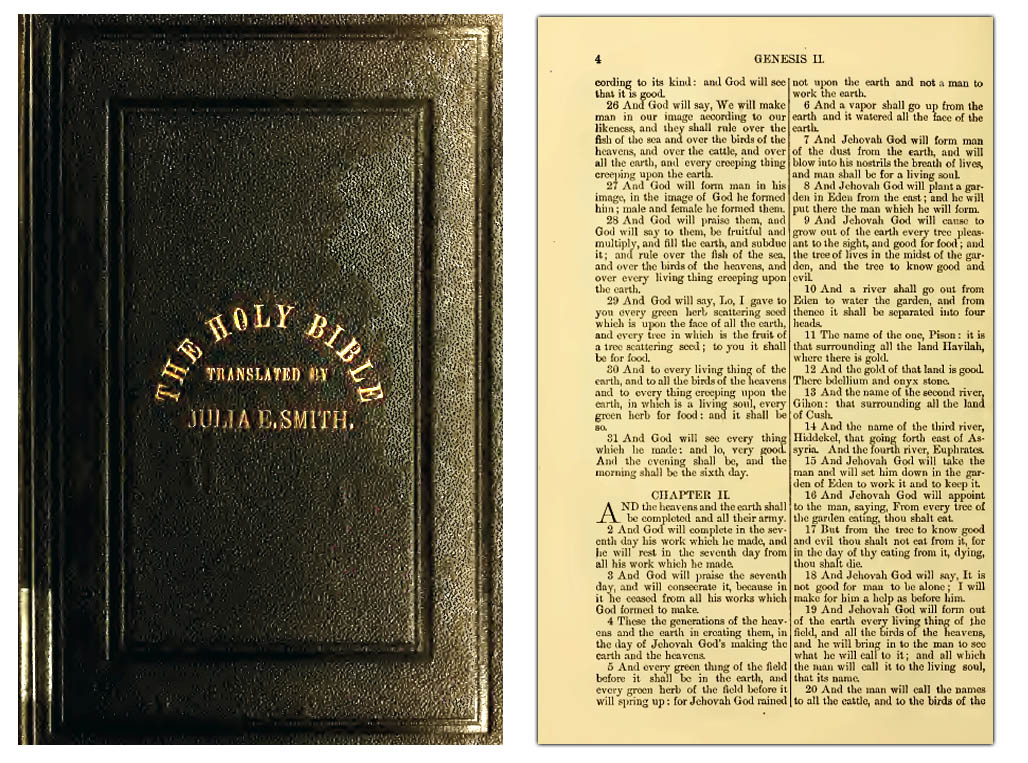
So not having much opportunity to see the literal, accurate words, what did the multitudes study, memorize, and put their trust in?
In the last few centuries it was the King James "Authorized" Version:
- "for he is a liar, and the father of it" (KJV)
In the last couple of generations:
- "he is a liar, and the father of lies." (NASB)
- "for he is a liar and the father of lies." (NIV)
- "for he is a liar and the father of lies." (New Living Translation)
- "for he is a liar and the father of lies." (ESV)
Greek πρὶν Ἀβραὰμ γενέσθαι ἐγὼ εἰμί.
γενέσθαι, "to become" is in the infinitive, not past tense. Thus a rendering "before Abraham becoming" rather than "became". But together with "I AM" it lends to the three-part saying "who was, who is, and is coming"